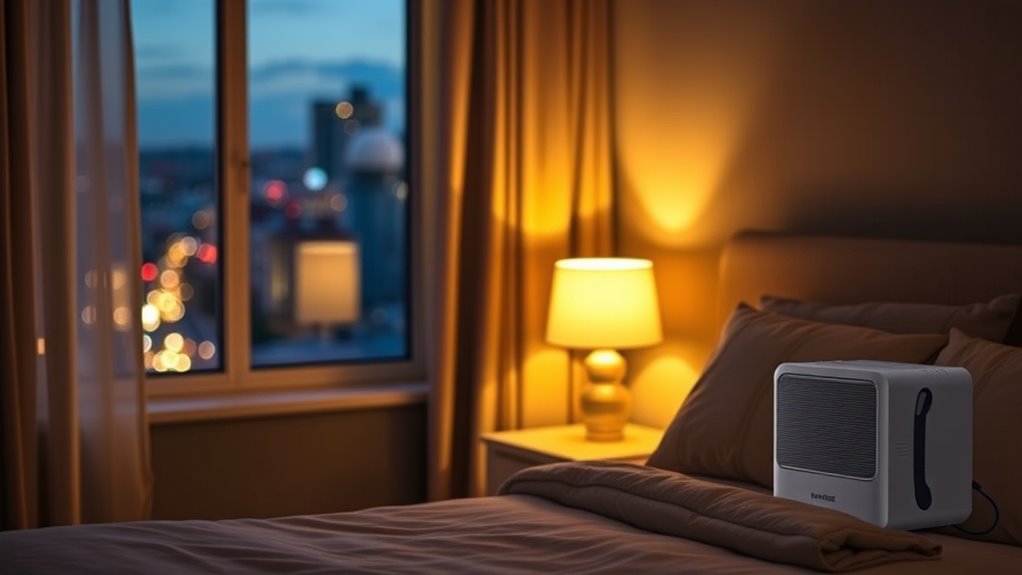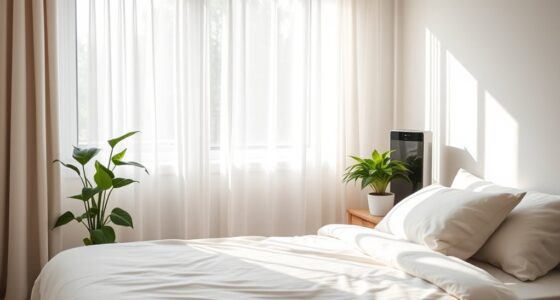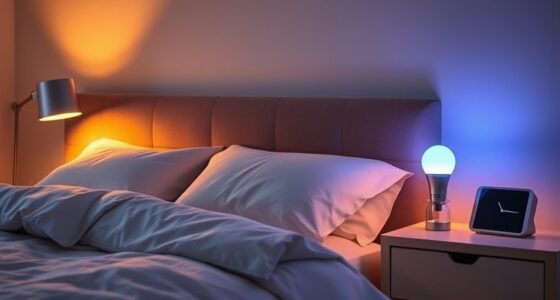Noise levels can considerably disrupt your sleep by causing fragmentation, delaying deep sleep, and waking you up more often. Common sources like traffic, household sounds, or neighbors’ activities can catch you off guard. To reduce noise, consider using white noise machines, earplugs, or soundproofing measures like heavy curtains. Managing environmental noise helps you achieve more restful, uninterrupted sleep. Keep exploring to discover more effective ways to create a quieter, more restorative sleep space.
Key Takeaways
- Noise disrupts sleep by preventing entry into deeper stages and causing fragmented, lower-quality rest.
- Loud or unpredictable sounds can wake sleepers or shift them to lighter sleep stages.
- Continuous noise exposure reduces sleep efficiency and delays REM and slow-wave sleep.
- Using sound masking devices, white noise machines, or earplugs can effectively block or mask disruptive sounds.
- Improving room insulation, adding heavy curtains, and relocating noise sources help create a quieter sleep environment.
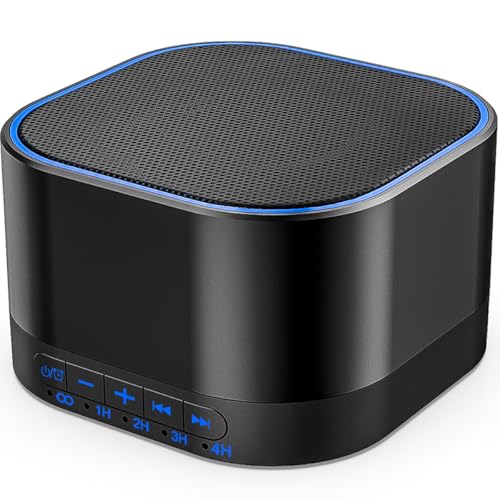
Magicteam White Noise Machine with 20 Non Looping Natural Soothing Sounds Memory Function 32 Levels of Volume Powered by AC or USB and Sleep Sound Timer Therapy for Baby Kids Adults Black
❤20 Non-Looping Sleep Sounds: White noise ,Brown noise, pink noise, blue noise, fan,brook, rain, ocean,bird and Bonfire,suitable for…
As an affiliate, we earn on qualifying purchases.
As an affiliate, we earn on qualifying purchases.
The Impact of Noise on Sleep Quality and Patterns
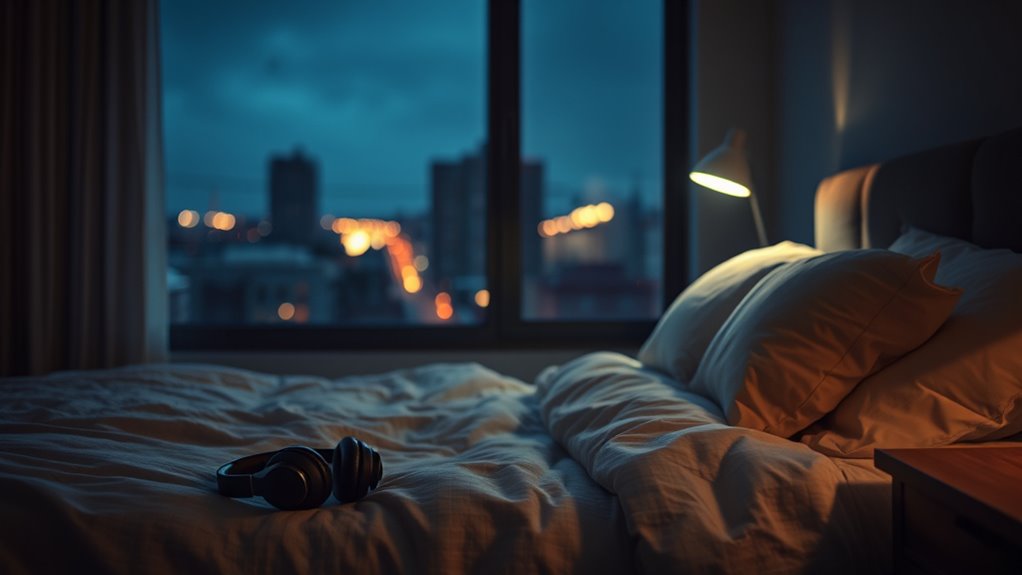
Noise can considerably disrupt your sleep patterns, often making it harder to fall asleep or stay asleep throughout the night. Noise pollution, especially during quiet hours, causes auditory disruptions that prevent your brain from entering deeper sleep stages. These disturbances can lead to fragmented sleep, leaving you tired and less refreshed in the morning. Even low-level noise can trigger your body’s stress response, increasing alertness and reducing sleep quality. Over time, persistent auditory disruptions may contribute to chronic sleep problems, affecting your overall health. Recognizing how noise pollution impacts your sleep helps you understand the importance of minimizing these disturbances. By addressing these issues, you can improve your sleep patterns and enjoy more restorative rest. Additionally, using soundproofing techniques can significantly reduce noise levels in your sleeping environment, promoting better sleep quality.

Loop Quiet 2 Ear Plugs – Ultra-Comfy Reusable 24dB (SNR) Noise-Reducing Earplugs for Sleep, Deep Focus, Travel, Noise Sensitivity, Flexible Hearing Protection, Customizable Fit
POWERFUL NOISE REDUCTION – Packing up to 24 dB (SNR) of noise reduction into a flexible silicone earplug,…
As an affiliate, we earn on qualifying purchases.
As an affiliate, we earn on qualifying purchases.
Common Sources of Noise That Disrupt Rest
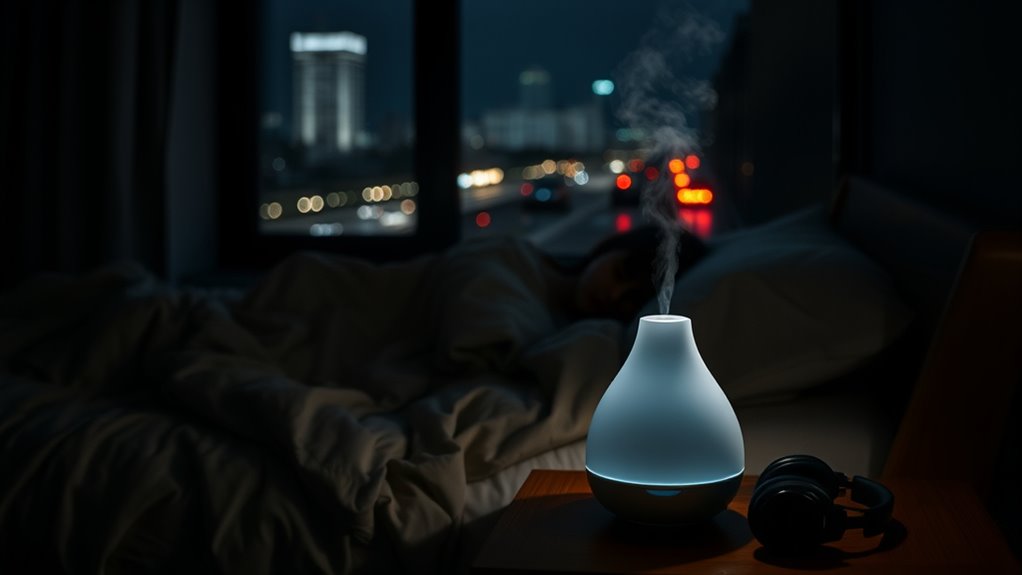
Many everyday sources contribute to sleep disruptions, often catching you off guard during quiet hours. Urban noise and household sounds are common culprits. These noises can wake you or prevent you from falling asleep easily. Recognizing these sources helps you manage them better. A variety of textile-based solutions such as soundproof curtains and fabric wall panels can also be effective in reducing noise levels. Some typical noise sources include: 1. Traffic and sirens from urban noise, especially at night 2. Household sounds like appliances, doors closing, or footsteps 3. Neighbors playing music or making noise 4. Pets barking or moving around
Many common sounds like traffic, household noises, and pets can unexpectedly disrupt your sleep.
These sounds can be unpredictable and vary in intensity. Being aware of these common disruptions allows you to take steps, like soundproofing or using white noise, to improve your sleep environment.
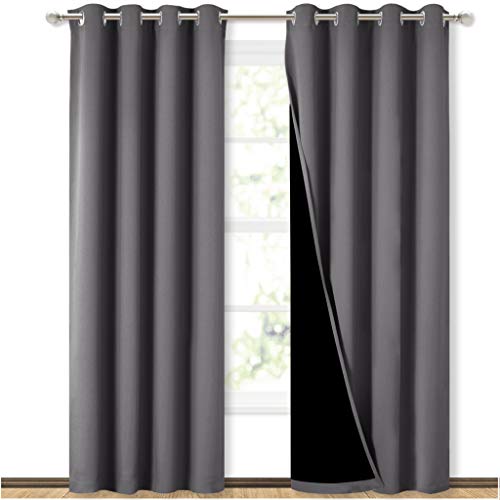
NICETOWN Grey Full Shade Curtain Panels, Pair of Energy Smart & Noise Blocking Out Blackout Drapes for Dining Room Window, Thermal Insulated Guest Room Lined Window Dressing(Gray, 52 x 84 inch)
Ready Made: 2 panels per package. Each Classic Lined Curtain measures 52" wide x 84" long (Total width…
As an affiliate, we earn on qualifying purchases.
As an affiliate, we earn on qualifying purchases.
How Different Noise Levels Affect Sleep Stages

The intensity and duration of sounds you encounter during sleep can considerably influence your sleep stages. Higher sound intensity, such as loud noises, can cause you to wake up or shift into lighter sleep stages, disrupting your rest cycle. Moderate noise levels may lead to fragmented sleep, preventing you from reaching deep, restorative stages. Noise frequency also matters; high-frequency sounds like alarms or sirens are more likely to disturb you than low-frequency sounds such as distant thunder or bass sounds. These variations can delay the progression into REM sleep or slow-wave sleep, which are vital for memory and physical recovery. Additionally, practicing environmental control to minimize disruptive sounds can promote more consistent sleep patterns. Understanding how different noise levels and frequencies impact your sleep stages helps you recognize the importance of controlling your environment for better rest.

Focusound 52 Pack Acoustic Foam Panels 1" x 12" x 12" Sound Proof Foam Panles Soundproofing Noise Cancelling Wedge Panels for Home Office Recoding Studio with 300PCS Double-Side Adhesive
Soundproofing – Acoustic foam panels triangular grooves structure for better noise absorption, helps to reduce and absorb unwanted…
As an affiliate, we earn on qualifying purchases.
As an affiliate, we earn on qualifying purchases.
Practical Strategies to Minimize Noise in Your Sleep Environment
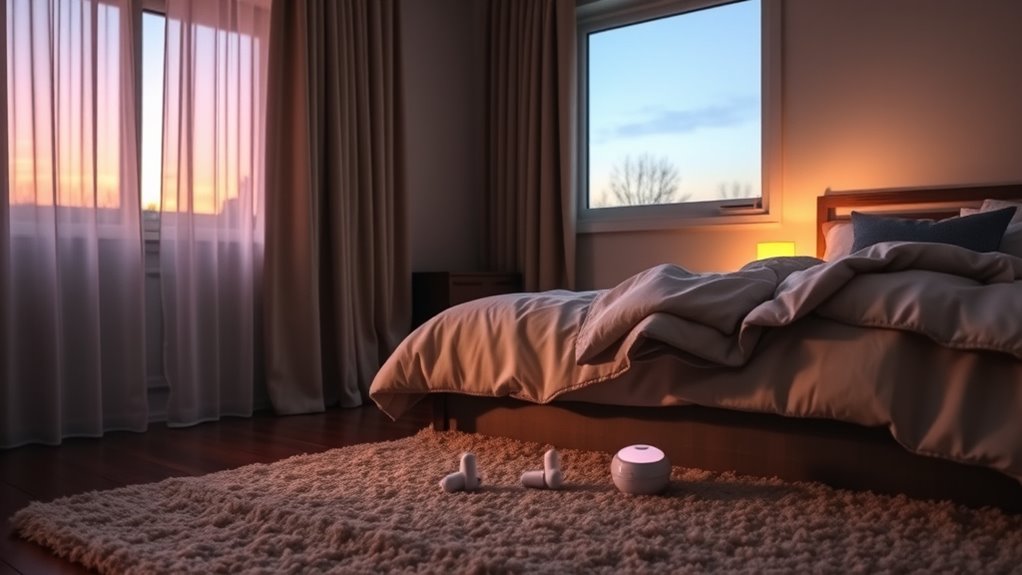
Creating a sleep-friendly environment often requires taking deliberate steps to reduce unwanted sounds. You can implement practical strategies like using sound masking devices that generate neutral background noise to cover disruptive sounds. Noise canceling headphones or earbuds can block out loud or sudden noises, helping you stay asleep. Additionally, consider adding heavy curtains or rugs to absorb sound reflections. Moving noisy appliances away from your bedroom can also make a difference. Finally, incorporating white noise machines or fans creates a consistent sound environment that masks unpredictable noises. Employing soundproofing techniques can further enhance your sleep environment by minimizing sound infiltration from outside sources. These techniques work together to create a quieter sleep space, making it easier to fall asleep and stay asleep through the night. Taking these steps can markedly improve your sleep quality by minimizing disruptive sounds.
Choosing the Right Sleep Aids and Soundproofing Solutions
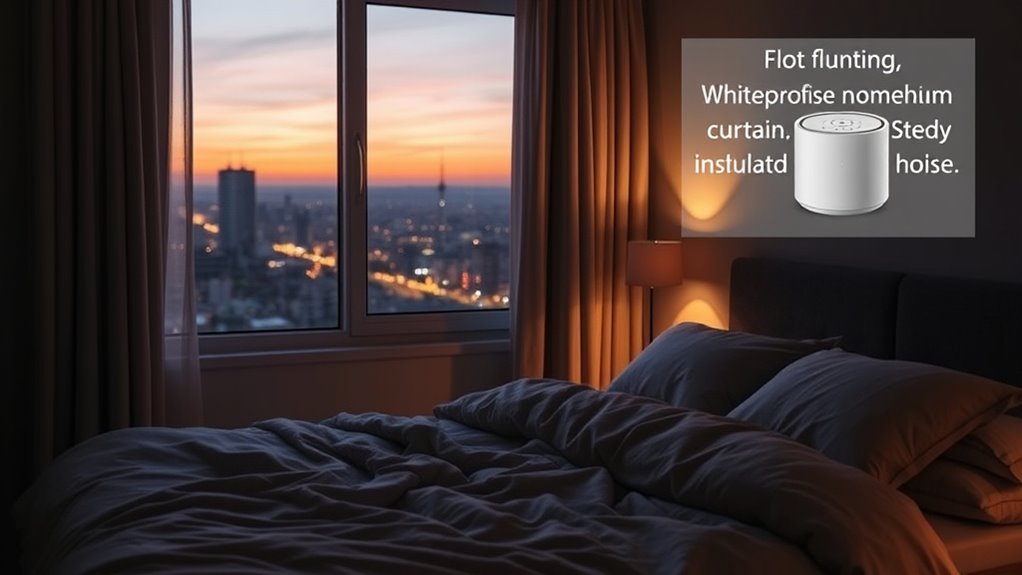
Choosing the right sleep aids and soundproofing solutions can considerably enhance your sleep quality by addressing both physical discomfort and environmental noise. White noise machines are effective at masking disruptive sounds, creating a consistent background that helps you fall asleep faster and stay asleep longer. Sleep masks can block out light and enhance relaxation, especially in noisy or brightly lit environments. When selecting sleep aids, opt for options like white noise or calming sounds that suit your preferences. Combining soundproofing techniques, such as sealing gaps or using heavy curtains, with these aids maximizes their effectiveness. Proper noise management is essential for achieving a quieter, more restful sleep environment. Experiment with different solutions to find what works best for you, ensuring a quieter, more restful sleep environment.
Frequently Asked Questions
How Does Chronic Noise Exposure Affect Long-Term Health?
Chronic noise exposure impacts your long-term health by increasing noise-induced stress, which elevates your heart rate and blood pressure. Over time, this puts you at higher cardiovascular risks like heart disease and stroke. You might not notice these effects immediately, but persistent noise can strain your body, making it crucial to find ways to minimize exposure. Managing noise levels helps protect your overall health and reduces stress-related risks.
Can Certain Sleep Positions Mitigate Noise Disturbance?
You can use your sleep posture to help shield yourself from noise disturbances. For example, sleeping on your side with a pillow against your head can act as noise shielding, reducing sound waves reaching your ears. Avoid sleeping on your back, which exposes your ears directly to noise. Experiment with different sleep postures to find what best minimizes noise impact, making it easier to fall asleep and stay asleep.
Are There Specific Noises That Promote Better Sleep?
Certain noises can help you sleep better. White noise provides a consistent sound that masks disruptive noises, creating a calming environment. Nature sounds, like gentle rain or ocean waves, also promote relaxation and improve sleep quality. You might find that these sounds drown out background noises and soothe your mind, making it easier to fall asleep and stay asleep through the night. Experiment with different sounds to discover what works best for you.
How Do Age and Hearing Loss Influence Noise Sensitivity During Sleep?
Imagine your age-related hearing changes making you more sensitive to noise during sleep. As you age, your noise sensitivity often increases because hearing loss can heighten awareness of even subtle sounds. This means you might wake more easily or struggle to fall asleep when noise levels fluctuate. Understanding this link helps you find ways to minimize disturbances, creating a more restful sleep environment tailored to your evolving hearing needs.
What Are the Psychological Effects of Constant Noise Pollution at Night?
Constant noise pollution at night can lead to significant psychological effects, including increased noise anxiety and sleep disruption. You might find yourself feeling anxious or restless, struggling to relax due to persistent sounds. Over time, this can cause emotional stress, irritability, and decreased mental clarity. Sleep disruption from ongoing noise interferes with your rest, making it harder to recharge mentally and physically, which impacts your overall well-being.
Conclusion
By gently tending to the subtle whispers of your environment, you can create a more serene sleep space. Small adjustments and thoughtful choices act as quiet guardians for your rest, helping you drift into restorative slumber. Remember, even the faintest change can turn restless nights into peaceful dreams. Embrace these gentle shifts, and let tranquility softly guide you toward nights of rejuvenation and well-being.
